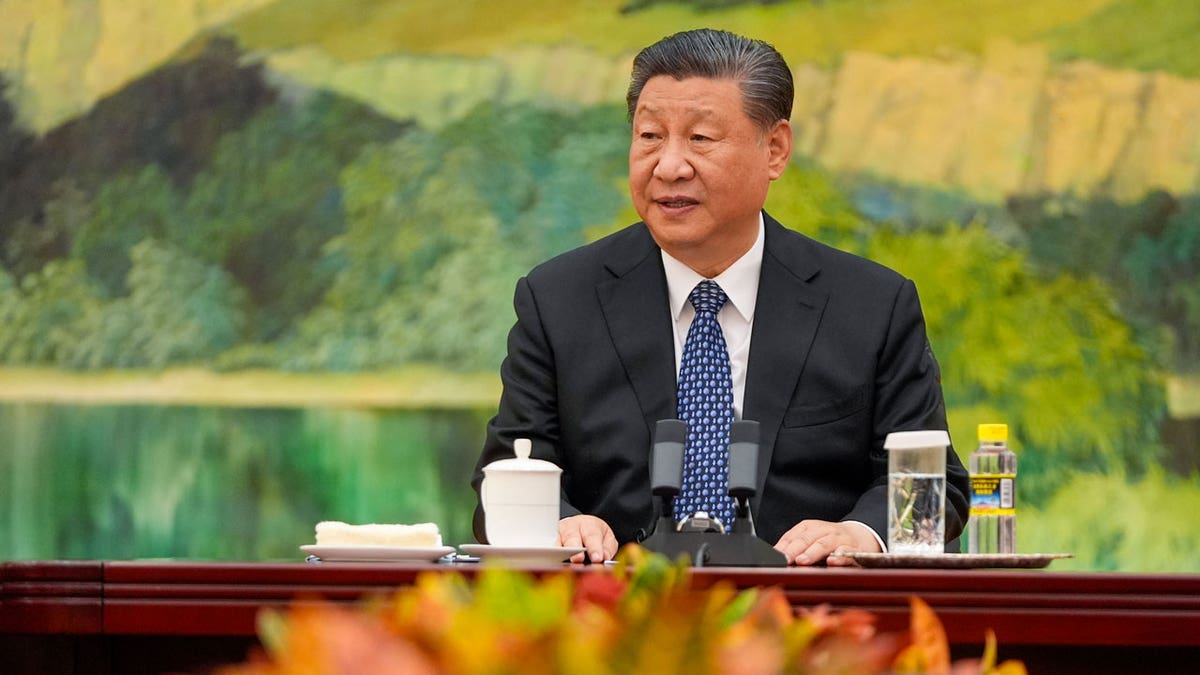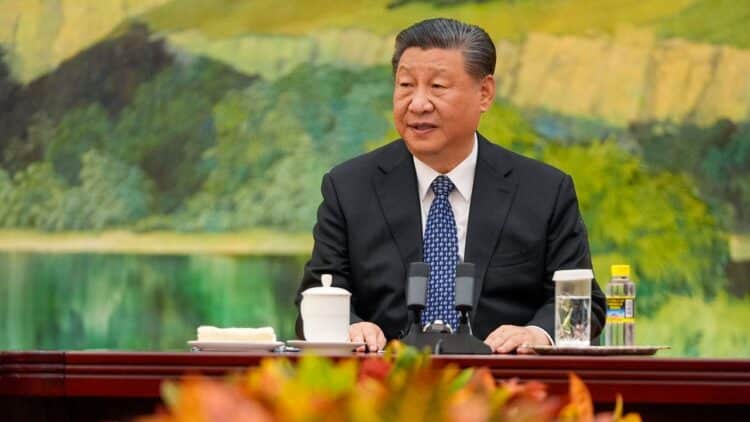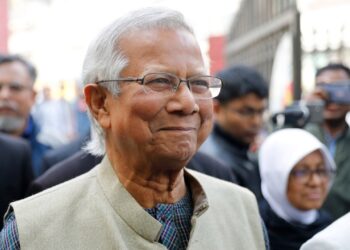- Chinese President Xi Jinping will visit France, Serbia and Hungary next week.
- China claims neutrality in the Ukraine war, but has refused to call the Russian assault an invasion and has been accused of supporting Russian weapon-making.
- The United States will be closely monitoring the visits for any indications of diminishing support for U.S. foreign policy goals.
Chinese President Xi Jinping will visit France, Serbia and Hungary next week as Beijing appears to seek a larger role in the conflict between Russia and Ukraine that has upended global political and economic security.
The visit by Xi, China’s president and head of the ruling Communist Party, is his first to Europe in five years and will “inject new momentum to the peaceful development of the world,” Foreign Ministry spokesperson Lin Jian said at a daily briefing on Monday.
China claims neutrality in the Ukraine conflict, but Xi and Russian President Vladimir Putin declared their governments had a “no limits friendship” before Moscow’s February 2022 attack on Ukraine. China has refused to call the Russian assault an invasion and has been accused of bolstering Russia’s financial and technological ability to continue producing weapons for use against Ukraine, which is awaiting tens of billions of dollars in military aid to counter Russia’s aggression.
CHINA IS RAPIDLY EXPANDING ITS INFLUENCE IN OUR BACKYARD AND US MUST ACT NOW
The Foreign Ministry said Xi’s visits will begin April 5 and end April 10 but gave no further details.
The visits will be closely watched in Washington for any signs of diminishing support for key U.S. foreign policy goals.
French President Emmanuel Macron prompted concerns in Washington during a visit to China last year after saying that France wouldn’t blindly follow the U.S. in getting involved in crises that are not of its concern, an apparent reference to China’s demands for unification with Taiwan.

Chinese President Xi Jinping talks to U.S. Secretary of State Antony Blinken at the Great Hall of the People on April 26, 2024, in Beijing, China. Chinese President Xi Jinping will visit France, Serbia and Hungary next week as Beijing appears to seek a larger role in the conflict between Russia and Ukraine, China’s foreign ministry said on April 29. (AP Photo/Mark Schiefelbein, Pool, File)
China has built strong relations with Serbia, including making a semi-secret delivery of an anti-aircraft missile system to the former Yugoslav republic in 2022.
The government of Hungarian Prime Minister Viktor Orbán delayed Sweden’s entry into NATO for months. NATO expansion has been cited by China as provoking Putin to invade Ukraine.
Orbán, a right-wing populist who has forged close ties with Russia, has said that criticism of Hungary’s governance by Swedish politicians soured relations between the two countries and led to reluctance among lawmakers in his Fidesz party to support Sweden’s NATO entry.
CLICK HERE TO GET THE FOX NEWS APP
The visits come after U.S. Secretary of State Antony Blinken met Friday with Xi in Beijing and stressed the importance of “responsibly managing” the differences between the United States and China as the two sides butt heads over a number of contentious bilateral, regional and global issues.
Also on Friday, Russian Defense Minister Sergei Shoigu hailed military cooperation with China during a meeting with his Chinese counterpart, Dong Jun, in Kazakhstan’s capital, Astana.
He said the cooperation is important as “new hotbeds of tension are emerging and old ones are exacerbating. In essence, this is the result of geopolitical adventures, selfish neo-colonial actions of the West.”
(this story has not been edited by TSA Mag staff and is published from a syndicated feed.)
- Chinese President Xi Jinping will visit France, Serbia and Hungary next week.
- China claims neutrality in the Ukraine war, but has refused to call the Russian assault an invasion and has been accused of supporting Russian weapon-making.
- The United States will be closely monitoring the visits for any indications of diminishing support for U.S. foreign policy goals.
Chinese President Xi Jinping will visit France, Serbia and Hungary next week as Beijing appears to seek a larger role in the conflict between Russia and Ukraine that has upended global political and economic security.
The visit by Xi, China’s president and head of the ruling Communist Party, is his first to Europe in five years and will “inject new momentum to the peaceful development of the world,” Foreign Ministry spokesperson Lin Jian said at a daily briefing on Monday.
China claims neutrality in the Ukraine conflict, but Xi and Russian President Vladimir Putin declared their governments had a “no limits friendship” before Moscow’s February 2022 attack on Ukraine. China has refused to call the Russian assault an invasion and has been accused of bolstering Russia’s financial and technological ability to continue producing weapons for use against Ukraine, which is awaiting tens of billions of dollars in military aid to counter Russia’s aggression.
CHINA IS RAPIDLY EXPANDING ITS INFLUENCE IN OUR BACKYARD AND US MUST ACT NOW
The Foreign Ministry said Xi’s visits will begin April 5 and end April 10 but gave no further details.
The visits will be closely watched in Washington for any signs of diminishing support for key U.S. foreign policy goals.
French President Emmanuel Macron prompted concerns in Washington during a visit to China last year after saying that France wouldn’t blindly follow the U.S. in getting involved in crises that are not of its concern, an apparent reference to China’s demands for unification with Taiwan.

Chinese President Xi Jinping talks to U.S. Secretary of State Antony Blinken at the Great Hall of the People on April 26, 2024, in Beijing, China. Chinese President Xi Jinping will visit France, Serbia and Hungary next week as Beijing appears to seek a larger role in the conflict between Russia and Ukraine, China’s foreign ministry said on April 29. (AP Photo/Mark Schiefelbein, Pool, File)
China has built strong relations with Serbia, including making a semi-secret delivery of an anti-aircraft missile system to the former Yugoslav republic in 2022.
The government of Hungarian Prime Minister Viktor Orbán delayed Sweden’s entry into NATO for months. NATO expansion has been cited by China as provoking Putin to invade Ukraine.
Orbán, a right-wing populist who has forged close ties with Russia, has said that criticism of Hungary’s governance by Swedish politicians soured relations between the two countries and led to reluctance among lawmakers in his Fidesz party to support Sweden’s NATO entry.
CLICK HERE TO GET THE FOX NEWS APP
The visits come after U.S. Secretary of State Antony Blinken met Friday with Xi in Beijing and stressed the importance of “responsibly managing” the differences between the United States and China as the two sides butt heads over a number of contentious bilateral, regional and global issues.
Also on Friday, Russian Defense Minister Sergei Shoigu hailed military cooperation with China during a meeting with his Chinese counterpart, Dong Jun, in Kazakhstan’s capital, Astana.
He said the cooperation is important as “new hotbeds of tension are emerging and old ones are exacerbating. In essence, this is the result of geopolitical adventures, selfish neo-colonial actions of the West.”
















